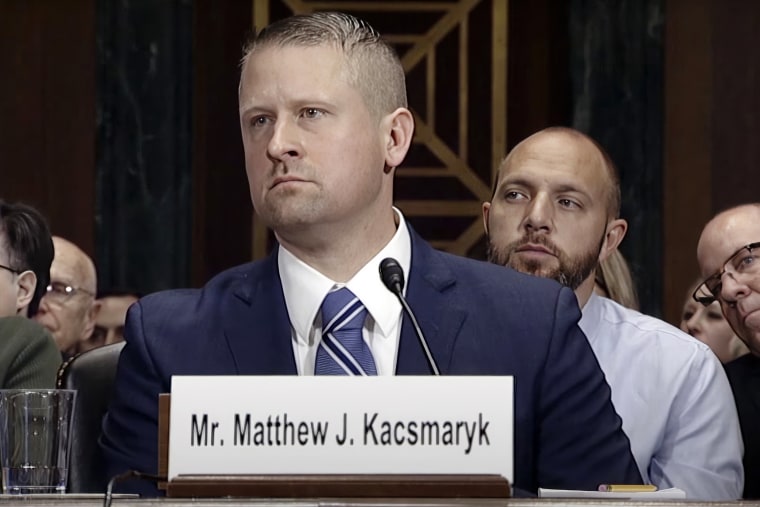U.S. District Judge Matthew Kacsmaryk’s decision to put the Food and Drug Administration’s approval of the abortion drug mifepristone on hold has thrown future access to medication abortion into question nationwide and laid the foundation for a high-stakes Supreme Court battle.
The ruling, issued Friday, is set to go into effect at the end of this week unless a higher court intervenes. The Justice Department asked an appeals court to block it Monday.
In interviews, several legal and medical experts said Kacsmaryk’s decision was unprecedented and clearly ideological. His language and reasoning, they said, closely mirrored arguments and concepts put forward by the anti-abortion movement — at the expense of scientific consensus in some instances.
The experts pointed to several key examples of the extreme nature of Kacsmaryk’s 67-page ruling, including his use of politicized terminology and apparent endorsement of the contentious idea of "fetal personhood." Here are the parts of the ruling experts found most striking.
Charged terminology: 'chemical abortion' and 'unborn human'
Kacsmaryk, a Trump appointee, earlier in his career represented a Christian conservative legal group that sued the federal government challenging the part of the Affordable Care Act that required employers to provide free insurance coverage for birth control.

In his ruling Friday, Kacsmaryk used various terms closely associated with the anti-abortion movement, according to the experts who were interviewed. Notably, Kacsmaryk referred to the two-pill regimen that is the most common way to terminate a pregnancy in the U.S. as "chemical abortion," rather than "medication abortion." The plaintiffs in the suit, a group called the Alliance for Hippocratic Medicine, use the same term in their filings and messaging.
"'Chemical abortion' is absolutely not a scientific or medical term. It is something that has been utilized and propagated by those who want to ban abortion or restrict abortion," said Dr. Jenni Villavicencio, an OB-GYN who is the American College of Obstetricians and Gynecologists’ lead for equity transformation.
Villavicencio characterized "chemical abortion" as an "emotive" term meant to inspire fear about the risks of ending a pregnancy.
She also highlighted Kacsmaryk’s references to a fetus as an "unborn human" or an "unborn child."
Kacsmaryk wrote that mifepristone "blocks the hormone progesterone, halts nutrition, and ultimately starves the unborn human until death."
Plenty of pregnant women use the phrase "unborn child" to describe their experiences, Villavicencio said, but it "certainly is not a scientific term, and it is not a term that should be used when discussing science and medicine."
Kacsmaryk’s language implies a belief about when life begins — a question that continues to roil American society. Medical experts generally recognize around 24 weeks’ gestation as the point at which a fetus is able to survive outside the womb.
The notion of 'fetal personhood'
Kacsmaryk’s references to an "unborn child" align with other parts of his decision in which he suggests that any potential "side effects" or "significant complications" caused by mifepristone should apply to both the pregnant woman and "to the unborn humans extinguished by mifepristone."
Such wording, experts said, references the concept of "fetal personhood": the idea promoted by the anti-abortion movement that a fetus should be recognized as a person with constitutional rights from the moment of conception. Under that theory — which many legal analysts and abortion rights advocates oppose — an abortion would be considered murder.
"You will not find in the federal Constitution any terminology about embryo," said Michele Goodwin, a professor of law at the University of California, Irvine, adding: "You will not find the term 'fetus.' You will not find the term 'unborn child.'"
'Pregnancy is not an illness,' the plaintiffs say
The FDA approved mifepristone in 2000 under a regulatory provision called Subpart H, which allows for accelerated approval of drugs that studies have shown are safe and effective for treating serious illnesses. The provision was used not to fast-track the drug’s approval, the Kaiser Family Foundation recently reported, but rather to regulate who could dispense the pills and where. (At that time, mifepristone could be given only by or under the supervision of a qualified doctor.)
In his ruling, Kacsmaryk argued that Subpart H shouldn’t have applied to mifepristone because pregnancy is a "normal physiological state most women experience one or more times."
The plaintiffs highlighted the same argument in a statement after the decision.
"Pregnancy is not an illness, and chemical abortion drugs don’t provide a therapeutic benefit. … The FDA never had the authority to approve these hazardous drugs," said Erik Baptist, a senior council for the Alliance Defending Freedom, which represents the plaintiffs.
But Mary Ziegler, a law professor at the University of California, Davis, and a historian who has studied the U.S. abortion debate, pushed back against that premise.
"Obviously people do suffer complications and death from pregnancy, especially in the United States, which has by far the highest maternal mortality rate in the developed world," Ziegler said. (A National Center for Health Statistics report last month found that the U.S. maternal mortality rate rose significantly in 2021 compared to the two previous years.)
Villavicencio said pregnancy can be thought of both as a natural state for women to enter and as a medical condition that requires specialized care.
"There is a reason why insurance covers it. There’s a reason why there are physicians that train half their lives in order to treat people who are pregnant — because it absolutely is a condition that is different than not being pregnant," she said, adding, "I think it really flies in the face of fact and understanding to suggest that it is not potentially a dangerous condition."
A key question: Do those challenging the FDA have the legal standing to sue?
In defending the FDA, Justice Department lawyers have questioned whether the group that sued has the standing to do so. To bring a lawsuit, a party must be able to show that it has suffered an injury.
Attorney Erin Morrow Hawley argued on behalf of the plaintiffs at a hearing last month that mifepristone’s approval has harmed some doctors because it forces them, "contrary to their most deeply-held ethical, medical, and religious convictions, to participate and finish elective abortions."
Kacsmaryk agreed, concluding that "adverse events from chemical abortion drugs can overwhelm the medical system and place 'enormous pressure and stress' on doctors during emergencies and complications."
But Ziegler questioned that reasoning. Usually, at least one plaintiff needs a "concrete injury to get standing," she said, but in her view, "we don’t appear to have one here."
Then there’s the question of whether it’s too late to challenge the FDA’s approval 22 years later. Kacsmaryk said the plaintiffs can still sue because the FDA changed its rules about mifepristone in 2016 and 2021, thereby reopening its approval to challenges.
It’s unusual legal reasoning, Ziegler said: "The judge had to basically jump through a lot of hoops to get there."


